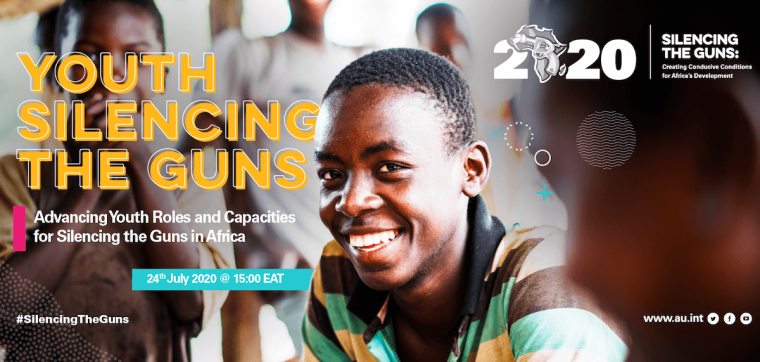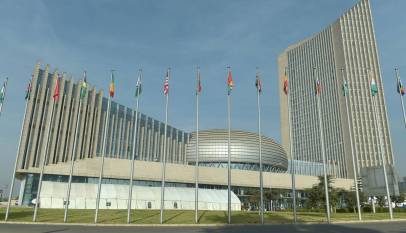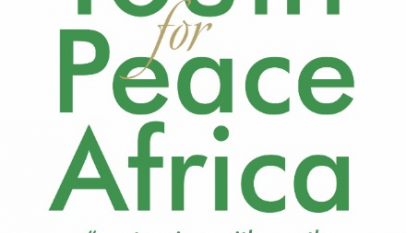AU Youth Envoy launches regional dialogues on youth’s role in Silencing the Guns
As part of the Youth Silencing the Guns campaign launched by the African Union (AU) in July 2020, the African Union Office of the Youth Envoy (OYE), has launched a series of regional consultations on the roles of youth engagement in Silencing the Guns in Africa

In recognition of the situation of continuing insecurity and instability across Africa, the African Union Peace and Security Council (PSC) had in November, 2016 convened a retreat dedicated to the theme: ‘Practical Steps to Silence the Guns in Africa by year 2020’ which was almost immediately followed by the adoption of the AU Master Roadmap of Practical Steps for Silencing the Guns in Africa by 2020, in January, 2017.
Moreover, in July 2019, in a bid to fast-track the ongoing efforts of achieving the goal of conflict-free Africa, the AU Executive Council had decided that the AU Theme of the Year 2020 would be ‘Silencing the Guns: creating conducive conditions for Africa’s development’. This continuous effort from all stakeholders and the will for inclusivity birthed the launch of the youth silencing the guns campaign, focused on advancing youth roles and capacities for silencing the guns in Africa.
Consequently, the African Union Office of the Youth Envoy (OYE) is convening six (6) regional Intergenerational Dialogues (IGDs), which will feed into the youth declaration on the AU Theme of the Year and AU Youth Envoy briefings to both AU Peace and Security Council and UN Security Council.
It was on this note that the East Africa Regional Consultation on the Roles of Youth in Silencing the Guns was convened Tuesday, which discussed the role of youth in Silencing the Guns in the East Africa region. The panel discussion focused on identifying the specific activities that the youths could carryout in advancing the Silencing the Guns agenda; the challenges and gaps that hinder the effective participation and contributions of youths towards Silencing the Guns. The convening also provided policy and action-oriented recommendations towards addressing the identified challenges and barriers to youth’s participation in Silencing the Guns.
Hon Siraj Fegessa, director in charge of peace and security at the Intergovernmental Authority on Development (IGAD), in his welcoming address, said the main objective of the youth silencing the guns campaign was to provide a platform to mobilize the development of key actions that could be undertaken by youths to fast-track the implementation of the Silencing the Guns agenda in Africa.
Fegessa said the role of youth in silencing the guns, conflict prevention, resolution and management in Africa was very crucial, adding that youths should not be seen as perpetrators of conflicts but as instruments for security building and sustained peace. He said African youths had the responsibility of ensuring that security related issues were resolved in the region. “Youths are primary actors and stakeholders in peace building,” he said.
He decried the fact that the East Africa region had been afflicted with conflicts and criminal activities, noting that, “All stakeholders need to work collaboratively in peace building process, as seen in Somalia and Uganda.”
In an opening remark sent to the meeting, Amb. Fred Ngoga, head of conflict prevention and early warning at the AU Commission, described the consultation series as critical to the successful engagement of youths in Silencing the Guns project, adding that the series would serve as a platform for young people to engage, deliberate and proffer measures to achieve an ‘integrated, prosperous and peaceful Africa’ as envisioned by the AU. He assured that the AU was working to foster youth development on the continent. “We believe that youth development and capacitation is essential to building peace and security in Africa,” he said.
Ngoga acknowledged the role of young people in various government interventions during the COVID-19 pandemic. He however said issues such as financial instability, unemployment, gender violence, lack of inclusion, amongst others, have contributed to youth’s involvement in conflicts and criminal activities. He therefore restated the AU’s determination to facilitate meaningful engagement of youth in peace building and development in the East Africa region.
Ms Emma Ng’ang’a is one of five (5) regional African Youth Ambassadors for Peace (AYAP) appointed by the AU, to work with the AU Youth Envoy in championing the promotion of peace and security on the continent. In her good will message, Ng’ang’a said socioeconomic vulnerabilities had forced young men and women into joining criminal syndicates, perpetrating crimes and inciting conflicts.
She decried the fact that although the root causes of conflicts in Africa were not unknown and various solutions had been proffered, little or no changes have been recorded over the years, urging for active participation of youths in peace efforts. The peace ambassador nonetheless said OYE’s regional youth consultation series provides a conducive environment for youth to optimize their participation in conflict resolution, peace-making and peacebuilding at regional and continental levels.
Ng’ang’a urged AU Member States to create more awareness on human rights issues and called upon African youths to “Realize that this is our destiny, we must commit and dedicate ourselves, hold our leaders accountable, call out perpetrators of conflicts and demand for Justice. We must reflect on our past, where we are and where we want to be in the next 5 years. We are part of the situation that is happening today, by allowing little issues to define our reactions which led to the conflicts that we experience today.”
Another panelist, Ms Audrey Adhiambo, coordinator of the Young Women Mediation Programme at IPHRD-Africa, highlighted the need for gender inclusivity in peace processes, noting that the participation of young women was crucial to the promotion and maintenance of peace and security in Africa. “Most times, what we see during peace making processes are [female] career diplomats excluding young women who are also interested and willing to partake in conflict resolution and peacebuilding in the region,” she lamented.
Ms Adhiambo said IPHRD-Africa was committed to providing capacity building programmes for youths especially young women on peacemaking and mediation and recommended, as a strategy for enhancing gender inclusivity in mediation and peace development in the region, the endowment of mediation support fund for young women and mentorship opportunities for young women on reconciliation, amongst others.












